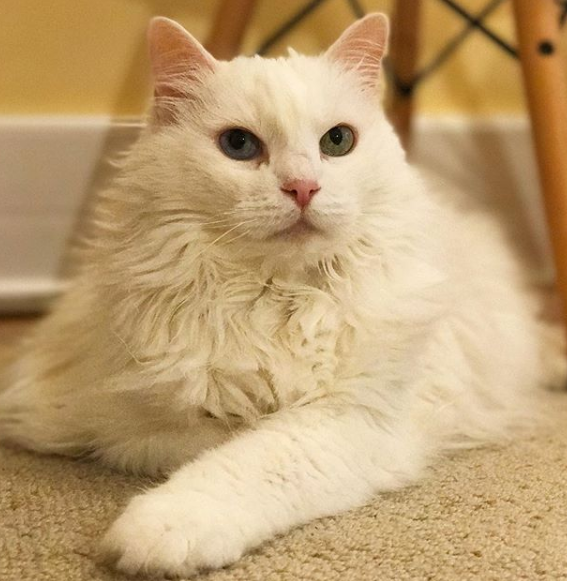Additionally, you should note that adult and older cats are more inclined to develop diabetes, as they also are prone to being overweight courtesy of their inactive tendencies.
That said, once I owned a cat that was diagnosed with diabetes (it is now no more, passed on of old age). I can still remember my shock and fear when I heard the news. The same is true for every cat parent. Diabetes symptoms include increased urination, lethargy, increased thirst as well as a loss of appetite. You cat will urinate urine that is sticky since it contains lots of sugars excreted from its body. If you do not treat the condition, it may lead to your cat’s death. But with treatment, your cat can lead a long, healthy and happy life like a normal cat. Following the diabetes diagnosis by a professional, you might have to give our cat regular shots of insulin as well as feed your cat on the best diabetes diet for cats to help manage the
Feeding Diabetic Cats
At this point, seeing that you are a caring parent eager to learn everything there is about your cat and the right feeding habits, you know that cats need animal meat in their diet. They require more meat than dogs do as they are not great in breaking down starch and carbs as dogs can. The case is even worse in diabetic cats.
The body of a diabetic cat faces a lot of difficulty in digesting and absorbing the sugar and glucose into the cells. Glucose as such builds up in the bloodstream to harmful levels. It only, therefore, makes sense to feed your cat on a diet with less starch to avoid straining your cat's body.
Research conducted shows that diabetic cats benefit greatly from diets rich in protein as well as fats but low in carbs. Kitten foods are great for this as they are rich in protein. In addition to kitten food, some professional vets may proceed to prescribe starch blockers like acarbose, which prevents the digestion of starch. This drug is, however, acquired only through a vet's prescription.
If you are keen on following a strict low carb/high protein diet for your cat living with diabetes, you should also consider canned cat food. These are designed to be low in carbs and high in protein in comparison to dry cat food.
Alternate Diet For Diabetic Cats
Aside from low carb and high protein diet, there is yet another diet perfect for diabetic cats. This is the high fiber diet. Cat foods that are high in fiber tend to slow the absorption as well as metabolizing of fat and glucose. This is to mean that on a high fiber diet, your cat will not have a high glycemic right after eating. A high fiber diet is also best to feed to overweight and obese cats. Your cat will have a feeling of being full for a longer period thus leading to reduced calorie intake. How does a high fiber diet achieve this? Well, for starters, it contains complex carb, which a cat's body tends to break down slowly. The slow digestion causes a reduced spike in glucose levels and the feeling of satisfaction for longer.
But before you jump on the high fiber bandwagon, you should note that the diet has a downside as well. One of which is that your cat may produce flatulence. Also, your cat's stool will increase, and the bowel movements will increase. For this reason, while a high fiber diet is an option, most cat parents, I included, prefer a high protein and low carb diet.
Changing Your Cat’s Diet
It is imperative that you work real close with your cat’s vet. The type of insulin shot will get, the dosage as well as how often the insulin shots will be will be determined by your vet being directed by the blood glucose levels your cat experiences courtesy of the diet it is on. A change in the diet means a change in glucose levels, and as such, your vet will need to make adjustments to the insulin dosage given to your cat.
Weight
Many cats living with diabetes tend to be overweight. A little weight loss could go a long way to making the issue a little better. But I should also point out that some diabetic cats are underweight. But this often occurs when your cat has suffered from diabetes and has gone untreated. Whichever the case, (overweight or underweight), you will need to get your cat's condition treated.
It is also important that I point this out. Diabetic cats still have caloric needs like normal healthy cats do, as such, while you are reducing the calorie intake for your obese or overweight cat by 25%, it is important not to allow the weight loss to go beyond 3% of its body weight every week. At first glance, I thought this was a small decrease, but when you consider the overall small weight of your cat, the margins are suddenly not so small.
Starving your cat can lead to another condition referred to as hepatic lipidosis. This is a condition in which fat collects around the liver, and it stops functioning normally. Aim for a steady loss rather than a drastic weight loss.
Factors to consider when choosing the best diabetic cat food
Below are some choosing tips that will come in handy when choosing the best diabetic cat food for your beloved feline.
Consider the animal content
Before you purchase any cat food, the first thing you should do is check on its labeling for the animal protein it contains. Cats are carnivorous. Their main source of nutrients is animal protein. Sure they may feed on watermelons, potatoes or popcorns once in a while, but their main nutrient source (what their bodies were designed to digest best), is an animal protein including chicken, fish, turkey, and beef. If the food has lots of vegetables and carbs, then it is not great for your diabetic cat.
Avoid Grains in the food
Cats may have an easier time digesting grains in comparison to carbs. However, it is important to note that while grains may be great for normal healthy cats, they are not ideal or recommended for diabetic, overweight of allergic cats. Always stick to a low carb, high protein diet.
Wet cat food or canned food is considered to be slightly better and healthier compared to dry food. The moisture content in canned foods benefits the cats greatly - especially those that are not great in drinking water as required. In addition to this, I have discovered that my cat, and most cats as well, love wet foods than dry cat food. Wet canned food is flavorful and features a strong scent.
The only downside of wet cat food is that it tends to go bad fast. Additionally, it provides you with control over your cats feeding habits and keeps you from free feeding your feline. If you want even more control, try homemade cat food. With homemade cat food, you will get to choose the exact proteins to offer your cat.
Consider life stages and analyze nutrients
Pet foods especially the best diabetic foods for cats should have a nutritional adequacy statement. This statement should state whether the food is for your adult cat, cats of all ages of just kittens or pregnant felines. Before you purchase, pay keen attention to this bit. This is because kittens and cats have varying nutritional needs even without factoring in health issues.
Be keen to read and analyze these pet foods. Normally you will be looking at the moisture, fiber, protein and fat contents. Make a quick comparison with other different cat foods to ensure you pick the best diabetic cat food.
Get Help while from a Professional Vet
But even while pet foods bear the feeding guidelines, you should always remember that other important factors come into play to determine the amount of each nutrient your cat needs. A diabetic cat, for instance, requires lots of proteins and reduced carbs. How much of each will be determined by your vet after a close analysis of the health condition, size, age and breed of your cat?
A body condition analysis is necessary. Your vet will also need to determine whether the cat is underweight, overweight or within the range of normal weight. Using these elements, a vet will provide his/her professional and well-informed diabetic cat diet recommendation.
Rebecca Welters created www.pawsomekitty.com. She's passionate about cats and has written many articles on interesting subjects related with cats, their care, breeds, behavior. She contacted us to share her content in our blog. Thank you Rebecca. Visit www.pawsomekitty.com to learn more about cats.
KITTY in NY provides in-home boarding and cat sitting solutions for your cat. New Yorkers have been enjoying our services for over 6 years. Please contact us and explain more about your cat/s and the service you need. We'll be glad to help you.


 RSS Feed
RSS Feed

